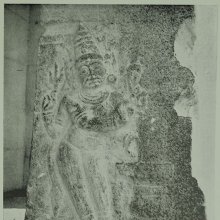Eman, Emaṉ, Ēmaṉ: 4 definitions
Introduction:
Eman means something in Hinduism, Sanskrit, Hindi, biology, Tamil. If you want to know the exact meaning, history, etymology or English translation of this term then check out the descriptions on this page. Add your comment or reference to a book if you want to contribute to this summary article.
Eman has 4 English definitions available.
Images (photo gallery)
Languages of India and abroad
Sanskrit dictionary
[Deutsch Wörterbuch]
Source: Cologne Digital Sanskrit Dictionaries: Böhtlingk and Roth Grosses Petersburger WörterbuchEman (एमन्):—
Sanskrit, also spelled संस्कृतम् (saṃskṛtam), is an ancient language of India commonly seen as the grandmother of the Indo-European language family (even English!). Closely allied with Prakrit and Pali, Sanskrit is more exhaustive in both grammar and terms and has the most extensive collection of literature in the world, greatly surpassing its sister-languages Greek and Latin.
See also (Relevant definitions)
Starts with (+3): Emanacacceti, Emanacam, Emanakam, Emanamam, Emanarvalli, Emanatanki, Emanatimuli, Emandar, Emandari, Emang, Emangulai, Emanimun, Emankalappu, Emankarpam, Emanki, Emankicam, Emankola, Emankulai, Emano, Emantam.
Ends with (+34): Aleman, Aneman, Apreman, Areuj dudureman, Ashuheman, Asreman, Atcheman, Atipreman, Bhuripreman, Ceman, Dampatipreman, Dhvastapreman, Guentneman, Hema, Hiranyaheman, Jeman, Kankaliyarasaheman, Kereman, Kinkeliba-tcheman, Kokweman.
Full-text (+6): Ema, Kalvanasa, Yogabhrashta, Emaracan, Mokshasadhana, Moksheccha, Mokshabhaj, Mokshabhava, Mokshavarttika, Mokshashastra, Mokshabhagiya, Mokshavat, Mokshadvara, Mokshaparayana, Mokshamahaparishad, Mokshantaranga, Mokshopaya, Mokshapuri, Mokshavimshaka, Mokshavimshakastotra.
Relevant text
Search found 1 books and stories containing Eman, Emaṉ, Ēmaṉ; (plurals include: Emans, Emaṉs, Ēmaṉs). You can also click to the full overview containing English textual excerpts. Below are direct links for the most relevant articles:
Complete works of Swami Abhedananda (by Swami Prajnanananda)
Chapter 8 - Buddhism in China, Japan and Korea < [Discourse 7 - Thoughts on Sankhya Buddhism and Vedanta]
